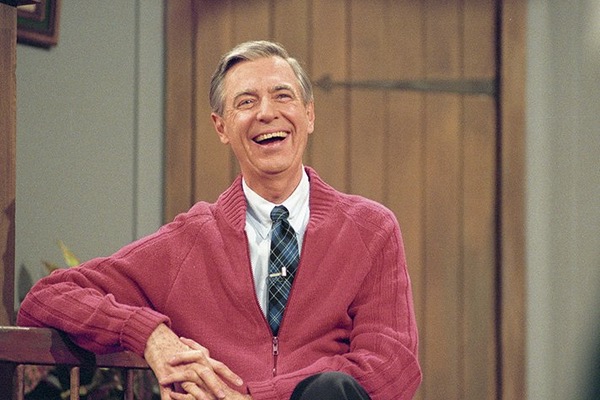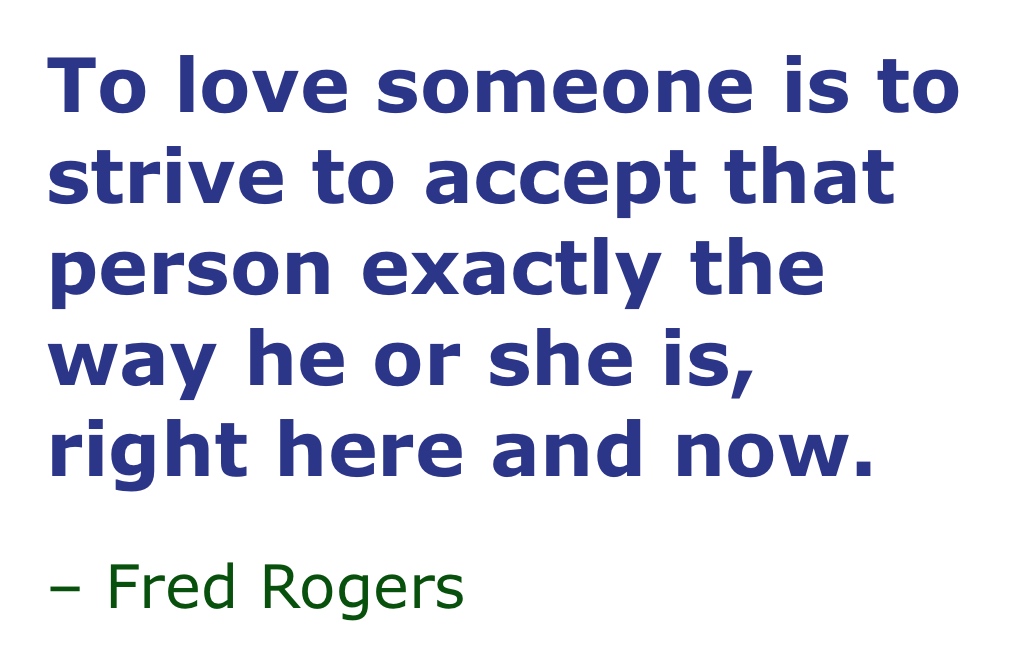 Ignatian spirituality teaches that everything begins and ends with the love of God. To put it simply: we were created to love and be loved. As I watched the movie A Beautiful Day in the Neighborhood, I was reminded how Fred Rogers’ lived and believed this simple truth. As a person who experienced his own insecurities as a child, his whole vocation became one large empathetic hug not just for children, but for all of humanity. It was his ministry to share God’s love with every person by reminding them of their inherent dignity and belovedness.
Ignatian spirituality teaches that everything begins and ends with the love of God. To put it simply: we were created to love and be loved. As I watched the movie A Beautiful Day in the Neighborhood, I was reminded how Fred Rogers’ lived and believed this simple truth. As a person who experienced his own insecurities as a child, his whole vocation became one large empathetic hug not just for children, but for all of humanity. It was his ministry to share God’s love with every person by reminding them of their inherent dignity and belovedness.
Universal Belovedness
As a parent—and a human being—I tend to focus on the future hope of humanity rather than the present moment. We can look at our children with consoling dreams and images of what they may become, and we sometimes miss them in the here and now. “To love someone is to strive to accept that person exactly the way he or she is, right now,” Rogers said. “I don’t think anyone can grow unless he’s loved exactly as he is now, appreciated for what he is rather than what he will be.” Ignatius taught that love shows itself more in deeds than in words. Our love of the other has the most force in its action, in its acceptance of the other, in the embrace of the other’s worth, in a loving gaze.
This message of universal belovedness—the fact that you are loved and worthy of love—is a message all of us need to hear. At some point in our lives we question this truth and, to some degree, become insecure self-haters. Often it takes another loving person to pull us out of that and remind us that we are loved just the way we are.
https://www.youtube.com/watch?v=ITNcGq60B3Y
True Self
Part of what Fred Rogers saw in every person is the True Self, the person God made them to be. At least he knew the true self was there even if it was buried under layers of masks and baggage. He understood the need that when discerning choices, we should make decisions from a deep sense of who we are at our core.
But being human is difficult. Having emotions that change with daily or moment-to-moment circumstances is hard. This is why he encouraged an attentiveness to our feelings, our interior. While Fred Rogers may have not known about Ignatian spirituality, he was a promoter of it each time he told us to talk about our feelings or to use our imagination. These are vehicles of God’s communication and can draw us closer to that true self we have deep inside. And Rogers knew that sometimes we let the false self take over, that good people can sometimes be bad.
Ignatius might talk about the false self as the evil spirit’s grasp on us. It’s those times when riches, honour, and pride seem like the most important characteristics of success. Jesus’ way to success, on the other hand—the way to the true self—is expressed as the opposite: poverty, lowliness, and humility. Mr Rogers adds a fourth path. “There are three ways to ultimate success,” he says. “The first way is to be kind. The second way is to be kind. The third way is to be kind.” Kindness is not only a path to humility but opens your heart up to another person, to be generous and open to whatever they have to offer. It’s synonymous with a definition of love I heard the other day. Love is allowing the space to see and understand the other. Rogers said that loving is the most important part of being alive.
He said, “As human beings, our job in life is to help people realize how rare and valuable each one of us really is, that each of us has something that no one else has—or ever will have—something inside that is unique to all time. It’s our job to encourage each other to discover that uniqueness and to provide ways of developing its expression.”
 Forgiveness
Forgiveness
This work Mr Rogers undertook for decades was the work of Jesus: bringing people together, breaking down walls, celebrating differences, reminding us of our common humanity and belovedness. A Beautiful Day in the Neighborhood opens with Fred Rogers, played by Tom Hanks, talking about forgiveness. Forgiveness is an expression of love. It’s an act that uncovers the true self, that free us from the unhealthy attachments we’ve been clinging to. Forgiveness is a tool to bring people together. It’s the call of the Christian, one that Rogers took very seriously.
“Forgiveness is a strange thing,” said Rogers. “It can sometimes be easier to forgive our enemies than our friends. It can be hardest of all to forgive people we love. Like all of life’s important coping skills, the ability to forgive and the capacity to let go of resentments most likely take root very early in our lives.” No wonder parents seem to value the importance of their children saying “I’m sorry” to someone they’ve hurt. But how much do us grown-ups value apologising and forgiveness? Sometimes we can get more caught up in the false-self-pride than in a vulnerable true self, admitting wrong, and asking for forgiveness – or extending it. This is why Mr Rogers’ message is perhaps more important for adults to hear. Children let go of resentments much more quickly than adults. Adults can hold on to resentments so long that they take them to the grave.
Silence and Listening
Other than our inherent belovedness, perhaps the other primary message that underlies all of Fred Rogers’ teachings is the importance of listening. This is also primary to Ignatian spirituality. When we don’t listen, we are deaf to God’s call. When we allow attachments and addictions to be the primary speakers in our life we do not hear the call to a deeper and freer self. When we dismiss feelings and emotions rather than listening to their wisdom, we can respond to them in unhealthy ways and make bad choices. This is why silence takes an important place in the spiritual life. It becomes a path to listening.
“Our society is much more interested in information than wonder, in noise rather than silence,” Rogers said in an interview with Charlie Rose. “And I feel that we need a lot more wonder and a lot more silence in our lives.”
Mister Rogers Neighborhood was slow. It took some time for my three-year-old daughter to get used to watching it with me. It’s certainly not her go-to TV show. Fred Rogers speaks slowly, he feeds his fish and pauses; he converses slowly with others and leaves silence after they speak to let the heart listen. His gentle and quiet way sharply contrasted with Mr McFeely, a fast-talking, always-in-a-rush mail carrier for the “Speedy Delivery” service. Whenever Mr McFeely stopped by Mr Rogers’ house in a frenzy, his encounter with Fred slowed him down. And when they watched fast conveyor belts and whirling machines in a factory video on Picture-Picture, the video even seemed to take a breath once in a while, the camera dwelling on one machine process for a while before moving on.
In the Tom Hanks movie there was a scene where Mr Rogers is in a restaurant with Lloyd Vogel, the cynical journalist with his own false-self baggage the movie centres around. Fred suggests they take a minute of silence for Lloyd to think about all the people who have loved him into being. And so the whole restaurant falls quiet. We see Fred and Lloyd at the table, sitting in silence – and we sit there in silence with them. About halfway through Fred Rogers looks at you. This was the most moving scene in the film for me. When Mr Rogers looked at me during that silence it was as if he was looking at the true me, my true self. It was as if he was loving me and seeing me with my inherent dignity and belovedness, and liking me just for being me. At the end of the minute I had tears in my eyes. It was a rare moment where all of us in the theatre shared a moment of being loved as we were.
“How many times have you noticed that it’s the little quiet moments in the midst of life that seem to give the rest extra-special meaning?” Rogers once said.
More and more Fred Rogers is ministering to me through his kindness and words. He reminds us what is most wonderful about humanity – that beneath the surface we are all loved.
Listen to the podcast version of this post…








Thank heavens for you your writing ✍️ was wonderful ❤️